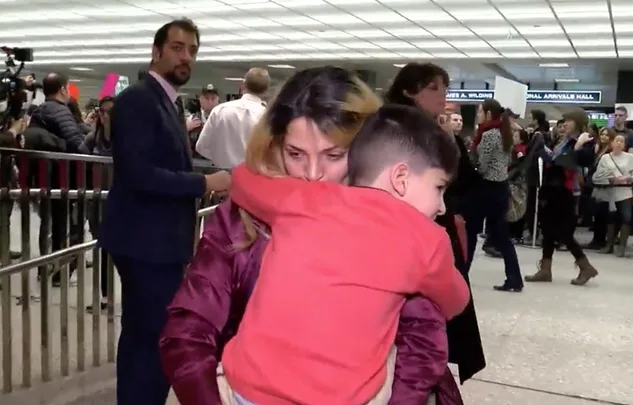A mother stands, her hands covering her mouth in the universal language of worry, craning her neck across the airport crowds. Then she sees him—her five-year-old son, his huge brown eyes still fearful even as a smile creeps across his lips. Drawing him into her arms and covering him with relieved kisses as relatives surround the reunited pair, this Iranian mother is one of the lucky ones: her boy was allowed into America, while so many are being turned back at the gate.
Last Friday, with a flourish of a pen, Donald Trump signed yet another controversial executive order —this time restricting immigration from seven predominately Muslim countries, including refugees—and changed lives for the worse as he did so. As Jihadist groups celebrate, lawyers rush to airports around the US to assist travellers who were detained for hours and Canadian PM Justin Trudeau restores our faith in humanity by offering to take in the refugees, and protests continue across the country, the real stories behind the ban are emerging.
Here are some of the most heartbreaking:
Elderly wheelchair-bound couple with green cards detained
A frail couple in their eighties were detained at Washington Dulles airport despite holding green cards, their granddaughter told The Daily Beast. Pegah Rahmani told reporters that both are confined to wheelchairs, while her grandmother recently had a stroke and her grandfather is blind. “They really weren’t treating them very nicely,” Rahmani said about her grandparents time being detained. “They took a lot of their stuff.” Including the medications their lives depend on.
Grandparents who won’t meet their grandchildren
At 37 weeks pregnant, Google executive Sanaz Ahari was looking forward to her parents attending the birth of their grandson in Seattle, but now worries they won’t even be able to visit the newborn and his older sister. The problem is their passports—the Iranians immigrated to Canada in 1996 but still hold Iranian passports. “It’s turned my life upside down—overnight—without notice,” she told the Wall Street Journal. “I don’t see a lot of light at the end of the tunnel,” Ms. Ahari said. “I feel helpless. It is devastating.”
Father who hadn’t seen son for three years detained
Haider Alshawi hadn’t seen his wife and seven-year-old son for nearly three years when he tried to fly to Texas to reunite with the pair, who fled Iraq in 2014. Due to his family’s ties to the US military, in 2010, insurgents attempted to kidnap Alshawi’s brother-in-law, and a car bomb killed some of Alshawi’s in-laws, according to court papers. He was eventually released after 24 hours in the airport.
Iraqi interpreter fears for his life
An Iraqi interpreter who risked his life working for the U.S. military, Hameed Khalid Darweesh, had been directly targeted twice for his association with the U.S. Armed Forces and waited two years for his family’s visas to be approved, his lawyers said. “I suffered to move here, to get my family here …. I can’t go back,” Darweesh said shortly after his release, the New York Post reported. Asked if he’d be killed in Iraq, he answered: “Yes, yes.”
Daughters separated from mother
After flying to New York from Baghdad, Iman Hussein was stopped by customs and booked onto a flight out of the country. Her two daughters, Elaf and Anfal Hussain, rushed to the airport to help, but their mother told them not to bother. “I haven’t seen her for seven years and now they want to send her back,” a tearful Anfal Hussain told the New York Post. “I’m really scared right now. She has been trying for two years to get her visa. She just got it Jan. 16th. She has been vetted. I don’t know what the problem is.”
Frail mother with no access to lawyer deported
A nephew desperately trying to speak to his detained aunt, a Yemeni citizen who was detained on arrival told Wired that the 68 year old suffers from diabetes and high blood pressure. Mohammed said she was going to be deported without access to a lawyer, and he wasn’t allowed to see him. She was on her way to live with her son, a citizen, and had a family visa. “It’s insane,” Mohammed said. “She’s not coming here to do anything bad. She’s sick. We just wanted her to come live the American dream.”
Scientist stranded
Due to fly to Boston to start a postdoctoral fellowship at Harvard Medical School studying tuberculosis, Iranian woman Samira Asgari was told in Frankfurt that she couldn’t board her flight. “I was pretty excited to join @soumya_boston’s lab but denied boarding due to my Iranian nationality,” she posted on Twitter. “Feeling safer?”
 Supplied
Supplied









